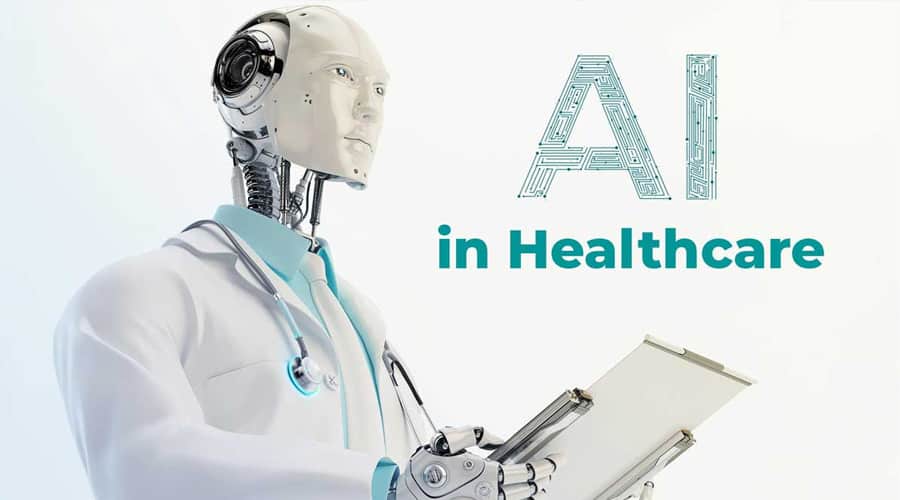Artificial Intelligence (AI) has been gaining significant attention in the healthcare industry due to its potential to perform tasks that typically require human intelligence. AI has already been integrated into healthcare in various areas, from predictive analytics to robotic-assisted surgeries, but its potential goes beyond that.
AI has the ability to provide personalized treatment plans, improve patient outcomes, and reduce healthcare costs. By the year 2026, it is estimated that the worldwide healthcare AI market will attain a value of $45.2 billion, exhibiting a compound annual growth rate (CAGR) of 44.9%. This article will explore the opportunities and challenges presented by the integration of AI in healthcare.
Opportunities
Personalized Medicine
Personalized medicine refers to tailoring medical treatment to each patient’s individual characteristics. AI can analyze a patient’s medical records, genetics, lifestyle, and other data to provide a personalized treatment plan that is tailored to their specific needs.
This can improve patient outcomes, reduce healthcare costs, and prevent adverse reactions to medication. IBM’s Watson for Genomics is an AI platform that analyzes a patient’s DNA to identify the specific genetic mutations driving their cancer. The platform then provides treatment recommendations based on the patient’s genetic profile, improving the likelihood of successful treatment.
Improved Diagnostics
AI can also improve diagnostic accuracy, from detecting cancer to predicting heart attacks. AI can analyze vast amounts of medical data and provide insights that are difficult for humans to detect.
This can result in earlier detection of diseases and more accurate diagnoses, leading to improved patient outcomes. For example, a deep learning algorithm developed by Google Health could identify breast cancer in mammograms with greater accuracy than human radiologists. The use of AI in medical imaging is also being explored to detect lung cancer, skin cancer, and other diseases.
Robotics
AI technology has improved the precision and accuracy of robotic-assisted surgeries. Robotic-assisted surgeries can result in less pain, shorter hospital stays, and faster recovery times. The da Vinci Surgical System is an advanced robotic surgical system enabling surgeons to conduct minimally invasive surgeries with enhanced precision and control.
AI can also be used to improve the training of surgeons. Surgical simulations that use AI can provide more realistic and challenging scenarios for trainees, helping to improve their skills and reduce errors in the operating room.
Challenges
Data Privacy and Security
One of the biggest challenges presented by the integration of AI in healthcare is data privacy and security. Healthcare data is highly sensitive, and any breaches can have severe consequences for patients.
AI relies on vast amounts of data to learn and improve, but this data must be properly protected to avoid privacy breaches. Additionally, AI algorithms can potentially introduce biases if the data used to train them is not diverse and representative.
Integration with Existing Healthcare Systems
Another challenge presented by the integration of AI healthcare is integration with existing healthcare systems. Healthcare is a complex industry with many stakeholders, and integrating AI into existing systems can be challenging.
There may be resistance from healthcare providers who are unfamiliar with AI technology, and there may be concerns about the impact of AI on jobs in the healthcare industry.
FAQs
What is personalized medicine?
Personalized medicine refers to tailoring medical treatment to each patient’s individual characteristics.
How can AI improve diagnostic accuracy?
AI can analyze vast amounts of medical data and provide insights that are difficult for humans to detect, leading to earlier detection of diseases and more accurate diagnoses.
What are the challenges presented by AI in healthcare?
Some of the challenges presented by AI in healthcare include data privacy and security concerns, ethical issues, and the need for integration with existing healthcare systems.
What is the da Vinci Surgical System?
The da Vinci Surgical System is an advanced robotic surgical system enabling surgeons to conduct minimally invasive surgeries with enhanced precision and control.
Conclusion
AI has made significant contributions to the healthcare industry, from predictive analytics to robotic-assisted surgeries. However, its potential in healthcare is vast, with the ability to provide personalized treatment plans, improve diagnostic accuracy, and enhance surgical precision. The global healthcare AI market is expected to proliferate in the coming years, reaching billions of dollars.
However, there are also AI challenges that come with integrating AI in healthcare, such as data privacy and security concerns, ethical issues, and the need for integration with existing healthcare systems. Addressing these challenges will be crucial in ensuring that AI is used to benefit patients and enhance healthcare delivery.
As technology advances and AI systems become more complex, their impact on the healthcare industry is expected to grow significantly. By leveraging the opportunities presented by AI while addressing its challenges, we can create a healthcare system that is more efficient, effective, and patient-centered.
